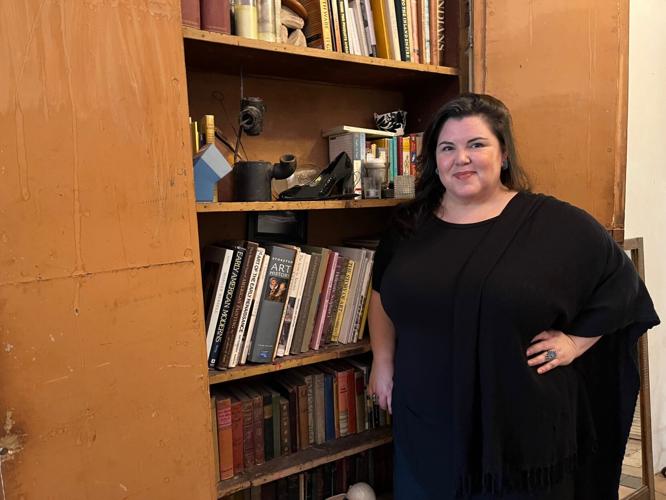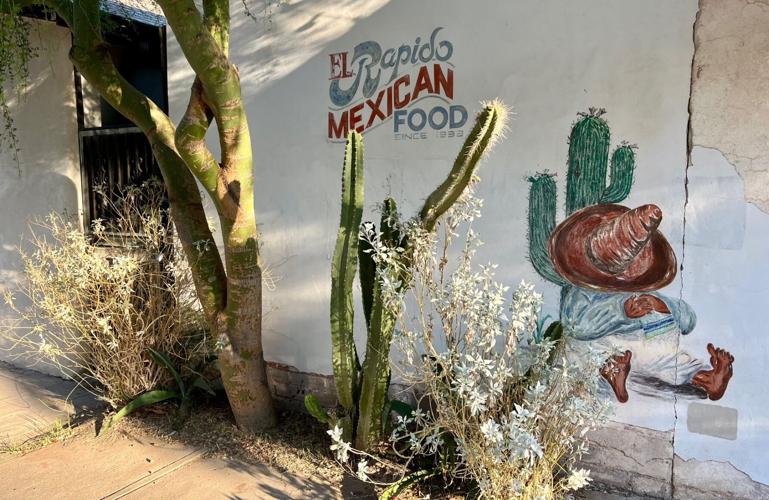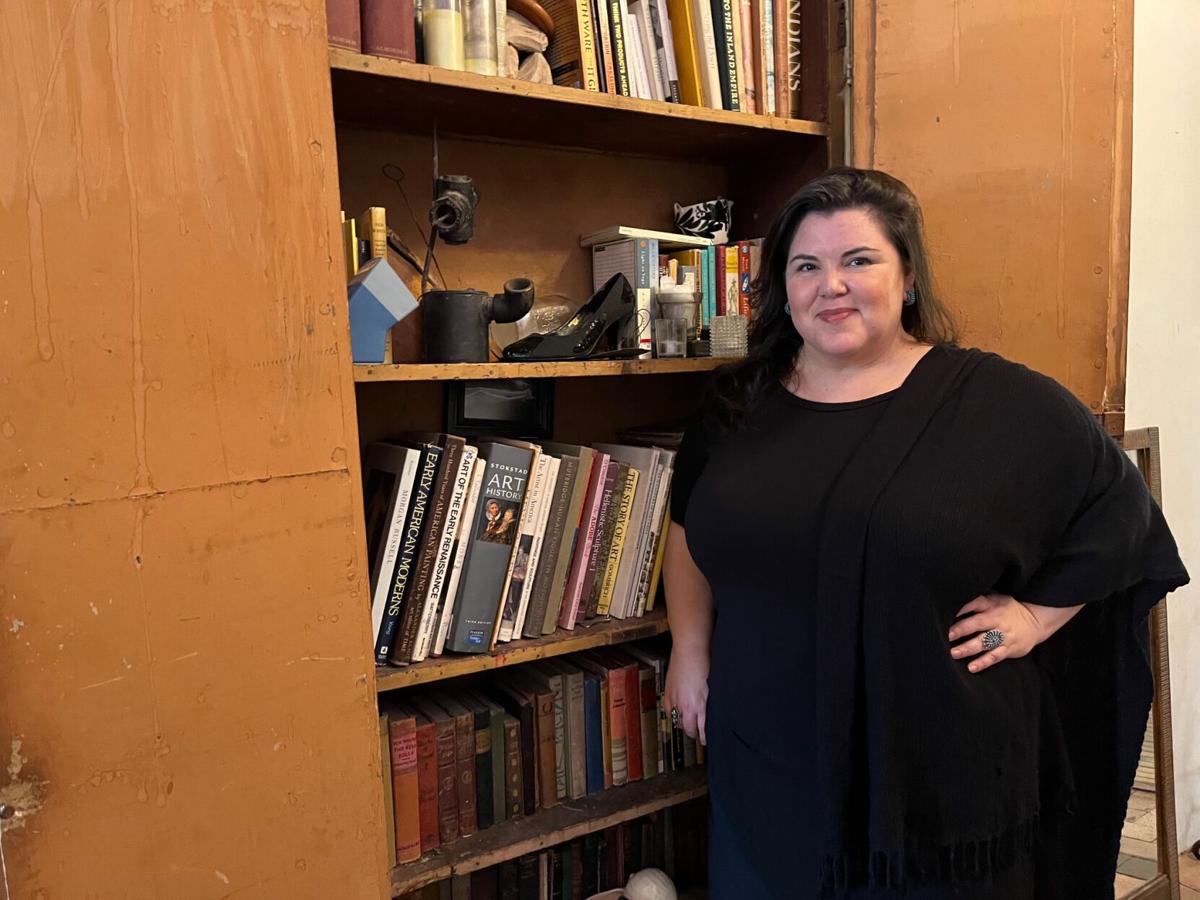On the white adobe wall of a small, one-story building on West Washington Street downtown, there is an aging mural now shaded by a large palo verde and partially hidden by cactus seemingly there to protect it.
It is easy to miss if you aren’t looking for it, but for a time — a long time — it was among the most familiar signs in Tucson.
It welcomed customers to El Rapido Mexican Food, which opened in 1933 and grew like the city around it for more than 65 years.
El Rapido evolved from a small neighborhood market to a popular tortilleria to a bustling lunch counter frequented by judges from the nearby courthouse and politicos from city hall.
“We even delivered,” Melani Martinez laughed. “My brother and I would hop on our little bikes and take lunch orders all over downtown.”
The business ultimately closed in 2000, but there is obviously a story there and who better to tell it than Martinez — a Borderlands writing instructor at the University of Arizona. Luckily for us, she does just that in “The Molino,” a loving memoir about a family that literally served our community for decades.
Scheduled for release Sept. 24 by University of Arizona Press, “The Molino” will be easy to spot. The cover is a photo of Martinez and her brother Ricky posing in front of that Washington Street mural in 1989.

It is a story about food, to be sure. More importantly, it is a story about family, the four generations of Perezes and Peyrons who managed and worked at El Rapido for 67 years.
Martinez introduces us to her great-grandparents, Aurelio and Martina Perez, who opened a small neighborhood market near the presidio during the Great Depression.
She describes the molino, a device that would grind and mix corn into masa.
She remembers the store’s first “tortilladora,” a large black machine that would transform balls of dough into warm, ready-to-eat tortillas.
“My job, and my brother’s job when we were little, was to take the finished tortillas off the end of the conveyor belt and put them in bags so we could sell them,” Martinez recalled. “It was a family business. Grandparents, aunts, uncles … we all pitched in.”
Still, “The Molino” is more than a nostalgic stroll down memory lane.
It also recounts Martinez’s own struggles to find her place … and whether that place should be El Rapido.
“By the time I was in high school and then college, I had pretty much decided to leave the restaurant behind,” she confessed. “I had worked there most of my life. I wanted to try something else, do something new.”
Then, in the fall of 2000, UA Professor Alison Deming asked her creative writing class to submit personal essays.
“It was the first time I’d written anything about my life, about my family,” Martinez said. “It was the first time I really tried to make sense of all the things in my head. It was hard.”
If writing the story was hard, reading it would become heartbreaking.
A week after submitting her essay, Martinez learned her father would be closing the restaurant for good on Christmas Eve. A week after that, she was asked to read her story in class.
“When I had to read it out loud, I broke down crying,” she recalls, tears again moistening her cheeks. “By then, I knew we were closing. I finally realized how much that meant to me.”
In time, Martinez decided to expand her original story into something more. Later still, she thought she might have a book. Now, more than 20 years later, she does.
“Part of the reason I wanted to write the book was to help me understand how I got to the place I was in college,” she said. “How might the story have been different if I hadn’t been so sure I wanted to leave the restaurant behind. It wasn’t until I started writing it down that I started to see how much it all mattered.”
The book, she said, is a hybrid memoir that weaves together history, stories, memories and poems.
“I struggled with it for a long time,” Martinez said. “The people in my family didn’t really want to talk about the history much. They didn’t like me showing up with my recorder. But they all had stories … stories about food, beauty, love, faith. I finally decided to mix it all together … like you would with a molino.”
The final touch was a decision to introduce a second narrator to the tale: the man napping beneath the saguaro on that Washington Street mural.
“I watched my Uncle Alberto paint that mural,” Martinez said. “There was something about that image that I knew was important to my family, so in my book I let him tell his side of the story. He is the poet. He is the thought. When I could have a conversation with him on the page, that’s when I knew the book was finished.”

El Rapido evolved from a small neighborhood market to a popular tortilleria to a bustling lunch counter.
UA Press and Los Descendientes de Tucson will host a book-launch party for “The Molino” on Sept. 29 at the Tucson Museum of Art, 140 N. Main Ave. The celebration is at 3 p.m. and is open to all. To register, visit uapress.arizona.edu/events.
FOOTNOTES
- Tony Peyron, Martinez’s father, was the kind of man who would take his work home with him. Literally. He cooked meats in a pit behind the house and served them at receptions and parties. Peyron, who managed El Rapido for more than 20 years, turns 80 next week.
Tucson author Jessica Elisheva Emerson will discuss her debut novel, “Olive Days,” Monday, Sept. 9, at Stacks Book Club, 1880 E. Tangerine Road in Oro Valley. The program begins at 6:30 p.m. Tickets, which include a copy of the book, are $32 or $37 for two tickets. RSVP at, visit stacksbookclub.com/events
- .
Poet Mark Wunderlich, whose latest collection is entitled “God of Nothingness,” will be on stage Thursday, Sept. 12, at the UA Poetry Center at 7 p.m. To learn more about the free event, visit poetry.arizona.edu
- .
Renowned Tucson architect Roy Place brought the Spanish Colonial Revival style to the Old Pueblo, as well as the Pioneer Hotel, Bear Down Gym, the Plaza Theatre, the VA Hospital, and dozens of other buildings in town.







